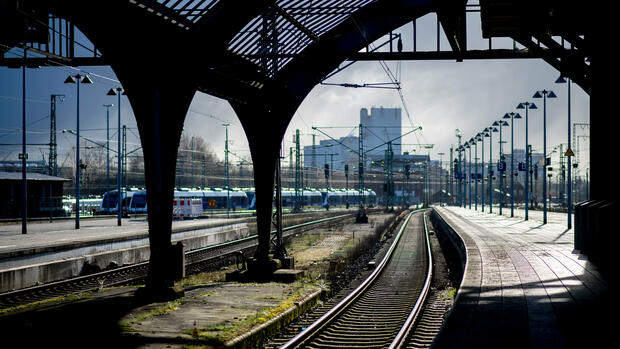Berlin From January 1, 2024, a new era for rail passengers in Germany is to begin: the state-owned group Deutsche Bahn AG will ensure a highly modern rail network with a new company.
In the future, the Deutsche Bahn subsidiary DB Netz AG and the DB Station and Service responsible for the stations will work together as “Infra-Go” (working title) to ensure that more trains will soon be running, punctually, affordably and regularly. Far more people should be happy to travel by train and leave the car at home, companies should be happy to put their goods on the rails and no longer on the truck. That’s what the SPD, Greens and FDP have agreed; Federal Transport Minister Volker Wissing (FDP) has declared the project a top priority.
The merger set the traffic light coalition. The network company should serve the owner, the taxpayer, in short: the common good – under the umbrella of the group.
In view of new record debts and an ailing rail network, Deutsche Bahn is ready to change – but not nearly as much as the coalition hopes. The unity between the federal government and the railways quickly ends with the question of who should report to the new company.
The board and union want to change as little as possible
The question of whether the group is giving up its influence on the network – or even just sharing it – is being disputed. The union wants to have a say. The management refuses and knows that the employee representatives are on its side.
Far more people should be happy to travel by train and leave the car at home.
(Photo: IMAGO/Chris Emil Janssen)
The board of directors speaks of a “minimally invasive procedure” at best. The second quarter that has just begun is considered “fateful”: According to the internal railway schedule, the group wants to clarify by the summer how it will merge and control its previously separate infrastructure companies in the future.
The railway chief representative for the conversion plans, Jörg Sandvoß, has already reassured the workforce. “We want to change as little as possible,” he clarified before Easter. The “financing architecture and the new management system” are the focus. “It’s not about boxes and lines in org charts.”
However, Minister Wissing wants to ensure that future climate and transport policy goals shape rail investments in the network – and have an influence on them. The ministry is talking about “difficult talks”.
The Deutsche Bahn board wants DB Netz AG to take on the DB station and service. Both parts of the group should remain “without ifs and buts” and as a “commercial enterprise”, as Sandvoß emphasizes.
What is yet to change
The parent company will get “a new name”. What else will change from Deutsche Bahn’s point of view? Instead of two, there will only be one board of directors, a supervisory board and a general works council.
Federal Transport Minister Volker Wissing (FDP) has declared the project a top priority.
(Photo: IMAGO/Chris Emil Janssen)
The railway management knows that the employee representatives are on its side. Martin Burkert, head of the railway workers’ union EVG, predicts at most “smaller synergy effects in the management of the company”.
The expectations are far too high, “because it is not about a railway reform”. At the same time, Burkert drew the red line, according to which the integrated DB group should not be broken up. “This assumes that the profit transfer and control agreements remain in place.”
Management like EVG want to have “peace in the group” after the merger of the divisions, as both sides say. The most important thing is that the federal government invest enough money in the network, through funds that are not dependent on the annual budget.
As in Switzerland, it should then be clear about them: “We want to have as many railways,” as infrastructure board member Berthold Huber says. He calls this “drawing a stable framework around the transport policy goals”.
Deutsche Bahn relies on the additional promised 45 billion euros
The budget politicians in the Bundestag still have to decide on the 45 billion euros agreed in the coalition by 2027 alone. Above all, it is unclear how the owner will be able to know in future what is happening with his money and how he can exert influence.
How does he intend to enforce his transport policy goals with the network board and monitor success? “Politicians can continue to exert their influence on the group through the supervisory board,” says trade unionist Burkert. He is certain that the new company will therefore remain an AG and not become a GmbH, as was politically intended.
>> Read here: Auditors call Bahn a “restructuring case” and advise breaking it up
“It’s a fight like the debate about the separation of the network and the operation of the railway 30 years ago,” says the ministry. It is already clear that the owner will ultimately have no power as long as the network remains part of the railway company. A structure in which the owner can take action is difficult to achieve so quickly and is a task for the time after the start. And so it’s just a matter of starting the new company by January 1, 2024.
More: When it comes to climate protection, Wissing relies on new truck drives instead of trains
